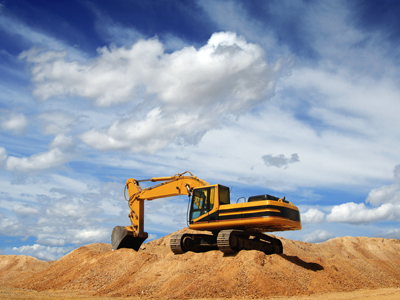Quarrying is the extraction of rocks and other materials from the Earth's surface. It has been around for a long time - as the agriculture in Britain gradually changed from nomadic to sedentary, people constructed permanent shelters for themselves and their livestock. As time progressed, the demand for rock increased.
Collecting suitable rocks that were lying around on the surface could no longer satisfy the demand so ancient Britons started to dig it out of the ground. For your middle school Geography exams, you need to know what factors affect the location of quarries plus the social, economic and environmental impacts, advantages and disadvantages.
Originally, the rocks in quarries were extracted by a variety of methods, one of which was to bore a hole in the rock and then drive a wedge into the hole. This cracked the rocks and broke pieces off that could then be shaped and used for construction. When explosives were developed, this allowed quarrying of rocks to be carried out on a much larger scale and using fewer people. It's not just rocks that are quarried, we obtain other building materials like sand and gravel which are simply dug out using large excavators.
Quarries have a huge impact on the environment and boost local economies by providing jobs. In areas where there is very little opportunity for employment such as rural areas, a quarry is important to the local community. Without it, people would either have to commute or move away. Sometimes, but not always, the presence of a quarry will bring investment in the transport infrastructure, new and better roads will be built, improving access for locals as well as for the heavy quarry traffic. When a quarry reaches the end of its useful life, it can be landscaped which can provide new local amenities. If managed carefully, this could even act as a tourist attraction, bringing money from tourism into the local economy.
On the other hand, opening a quarry has a big impact on local wildlife as it leads to habitat loss. The noise of blasting also scares off wildlife and can be a nuisance to local residents. It is inevitable that quarrying will create dust, this gets picked up by the wind, even just a light breeze can spread dust over a large area. This settles on people's property, cars, gardens, trees and so on. Not only does this look unsightly, it can be harmful to the health of plants, animals and people. Quarries are usually opened in rural areas and are seldom close to railroads, so the products are normally transported by road. This creates both noise and air pollution from engine fumes in the area near the quarry, which can harm wildlife, reducing biodiversity in the area. Air pollution also affects the local human population, particularly people with asthma or lung diseases. Some mineral quarries store waste in large lagoons, heavy rain can cause the lagoons to overflow and the containing walls to collapse, polluting nearby water courses and water supplies. In order to minimize the negative aspects of quarrying, laws exist that quarry owners must follow.








